

World Day Against Trafficking In Persons is observed each year on July 30 to draw global attention to the scourge of human trafficking and deliberate of ways which need to be adopted to end this crime. With the pandemic raging like wildfire, there has been an exponential rise in this transnational organized crime putting hundreds and thousands of children and women from the most marginalized and vulnerable sections of society at heightened risk.
Human trafficking has now emerged as a significant problem all over the world and is the third largest international criminal enterprise, generating an estimated $150 billion dollars annually (ILO, 2014).
Since the first lockdown, the Satyarthi Movement has collaborated with law-enforcement agencies to rescue approximately 9,000 children which has led to the arrest of 302 traffickers from trains, buses and factories from across the entire country. Children have thus become the biggest victim of the pandemic with the trafficking of children rising manifold of late.
The ongoing Monsoon Session of the Parliament proposes to take up the Trafficking in Persons (Prevention, Care and Rehabilitation) Bill, 2021, for deliberation. The Bill aims to “to prevent and counter-trafficking in persons, especially women and children, to provide for care, protection, and rehabilitation to the victims, while respecting their rights, and creating a supportive legal, economic and social environment for them”. The Women and Child Development Ministry had has invited suggestions for the draft Bill.
The Anti-Trafficking Bill has increased the scope of the nature of offences of human trafficking, with stricter punishment including life imprisonment and even death penalty in certain cases. The Bill addresses various aspects of trafficking – including prevention, combating the crime including re-trafficking, designating agencies for investigation, special courts for trial, rehabilitation of victims, very effectively and comprehensively and will become a landmark in dealing with this complex crime.
It may be recalled that a previous draft of the Bill was passed in the Lok Sabha in 2018 but wasn’t ever introduced in the Rajya sabha.
Deeply concerned at the rise in cases of trafficking, Nobel Peace Laureate Kailash Satyarthi has written to Members of Parliament and requested them to ensure passage of the proposed Bill in the upcoming session.
The passage of the Bill will be fulfilment of the demand of 12 Lakh Indians who marched across 22 states and 12,000 kms demanding a strong law against trafficking along with Shri Satyarthi in 2017.
National Consultation on
the Elimination of Human Trafficking
30 July 2021 | 10 am – 2pm
About Anti-Trafficking Bill
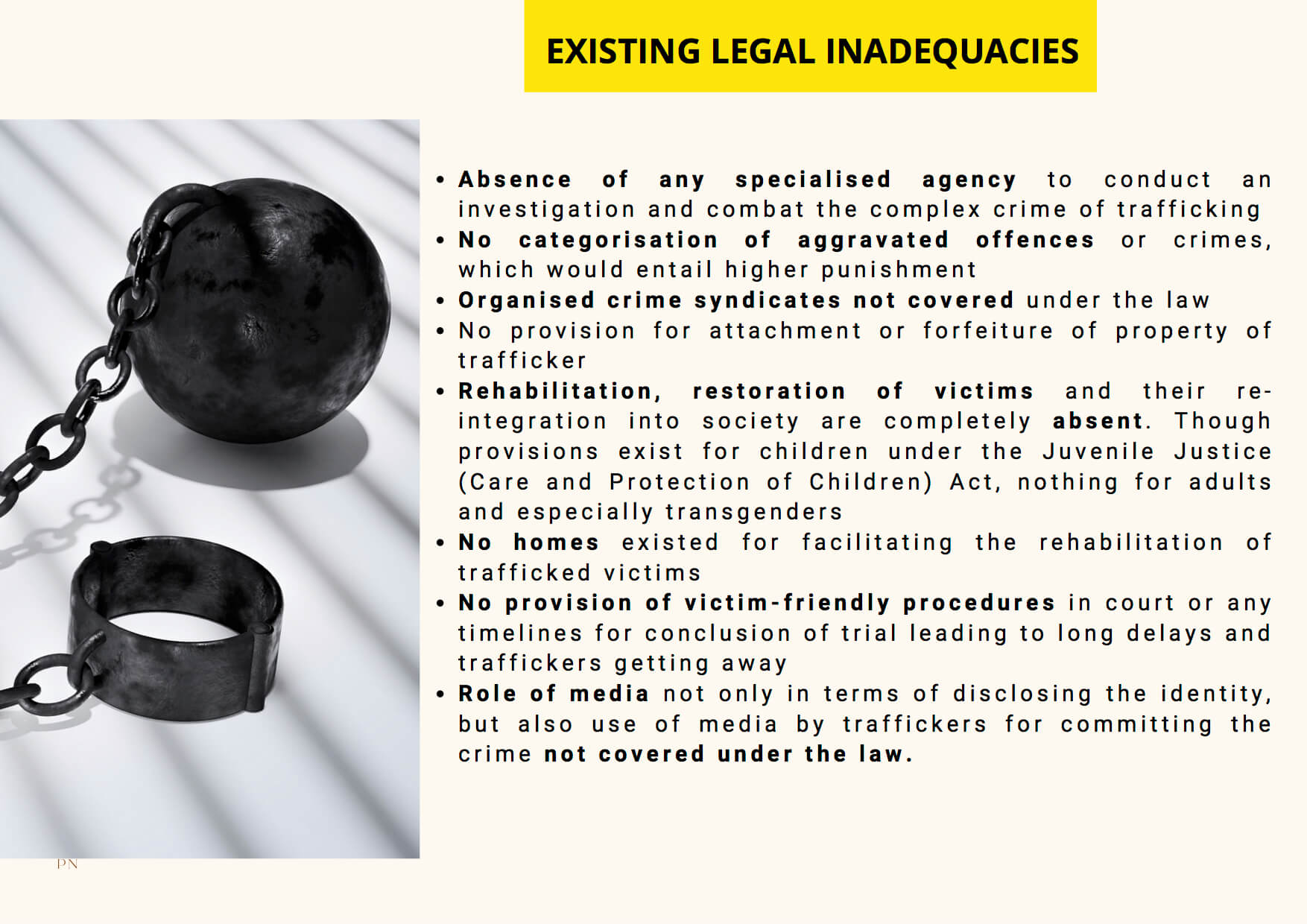

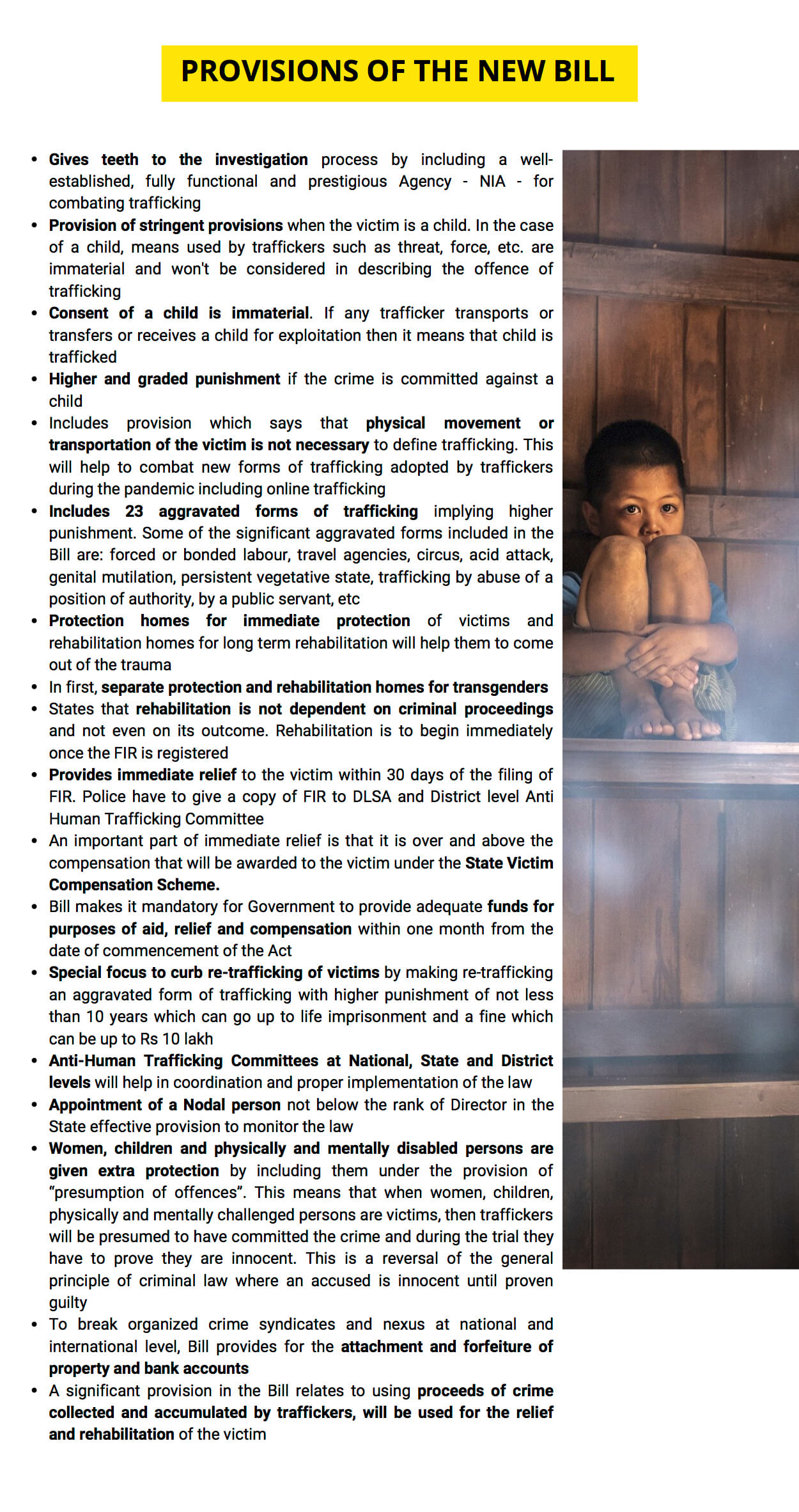

Nationwide Support
The current pandemic has led to an aggravation of the dangers faced by the most marginalized children in India. Child labour and trafficking has risen exponentially. Bachpan Bachao Andolan (BBA), a sister organization of Kailash Satyarthi Children’s Foundation (KSCF), has rescued more than 9000 trafficked children from trains, buses and factories along with law-enforcement agencies and 265 traffickers have been arrested from the entire country since April 2020.
In the light of alarming and unstoppable cases of trafficking and forced labour, the passage of the Trafficking in Persons (Prevention, Care and Rehabilitation) Bill, 2021 in the upcoming Monsoon Session of the Parliament, will ensure mitigation of the menace. The passage of this Bill will be a resounding victory for the 12 lakh Indians who marched across 22 states and 12000 kms in 2017, demanding a strong law against trafficking. Some of these marches were led and supported by many Parliamentarians across India.
To end the menace of trafficking, Kailash Satyarthi Children’s Foundation’s national activists, volunteers and partners are increasing awareness of citizens by organising events across constituencies and appealing to their Parliamentarians for urgent passage of the Trafficking in Persons, Bill 2021 in the upcoming Monsoon Session of the Parliament, from 15th July to 19th July, before the Parliament session begins. Smooth passage of this Bill is imperative to bring justice to thousands of children who have already been trafficked, sexually abused or remain at unprecedented risk.
Many Parliamentarians and political leaders have supported the appeal as mentioned below:
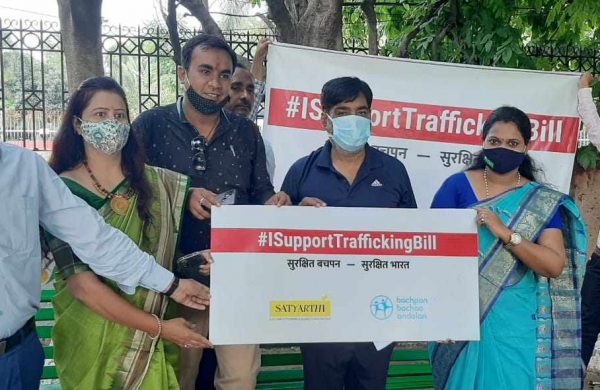

Ram Kirpal Yadav – Patliputra, Bihar
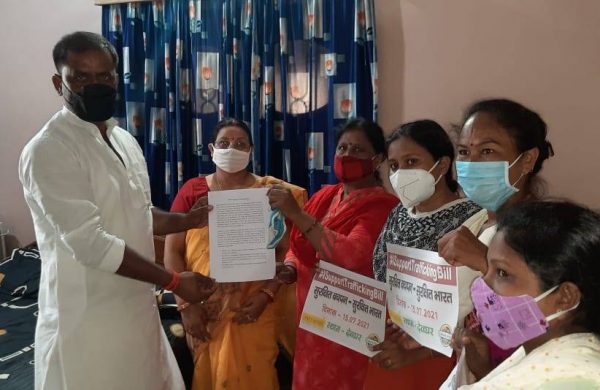


Nishant Dubey – Godda, Jharkhand
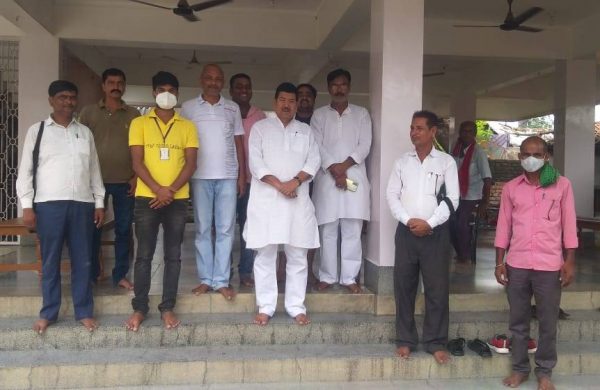

Dinesh Chandra Yadav – Madhepura, Bihar
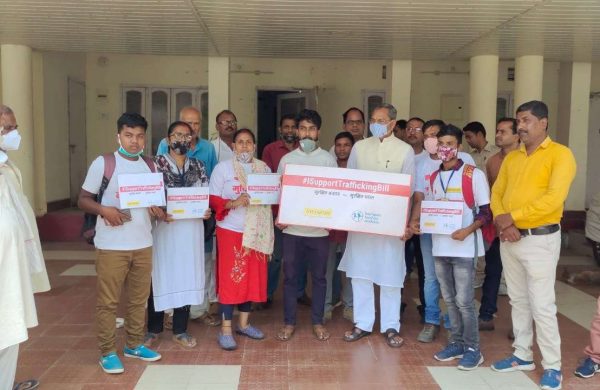

Dulal Chandra Goswami – Katihar, Bihar
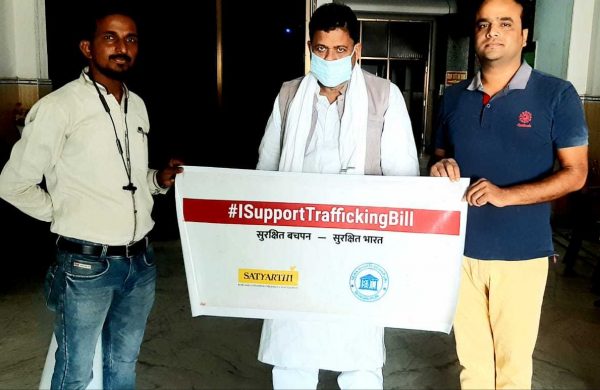

Girdhari Yadav – Banka, Bihar



Dr. Sukanta Majumder – Balurghat, West Bengal
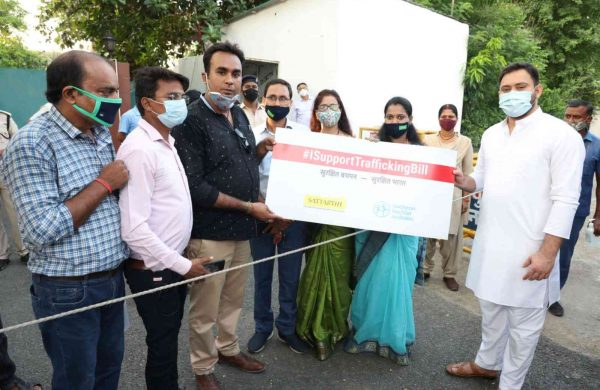

Tejaswi Yadav – Leader of Opposition, Bihar
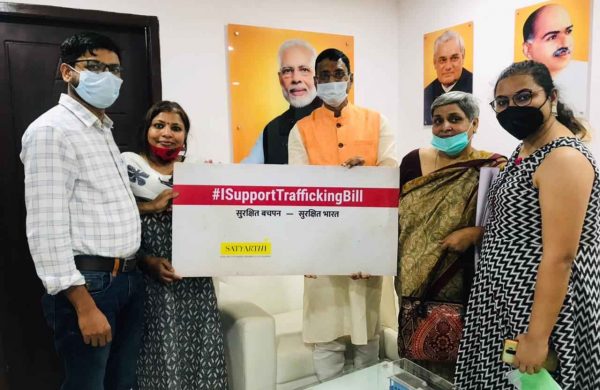

Sanjay Seth – Ranchi, Jharkhand
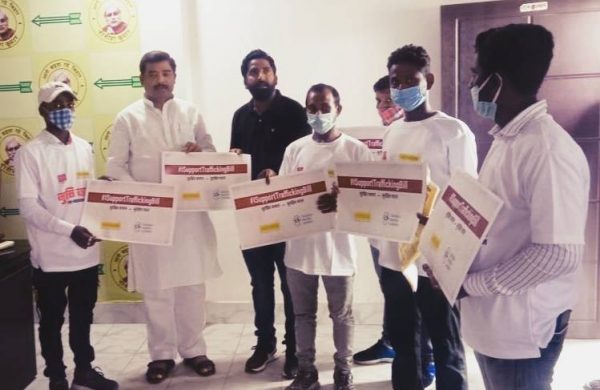

Santosh Kushwaha – Purnea, Bihar
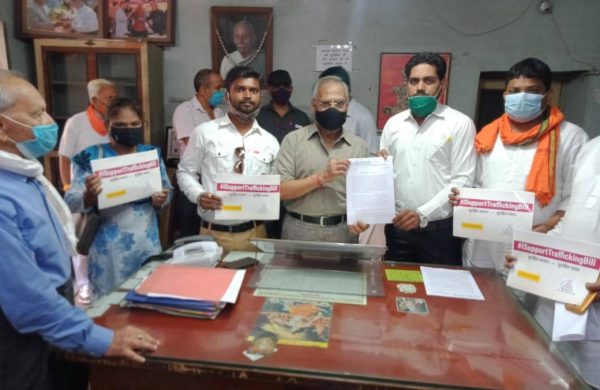

Vivek Narayan Shejwalkar – Gwalior, Madhya Pradesh
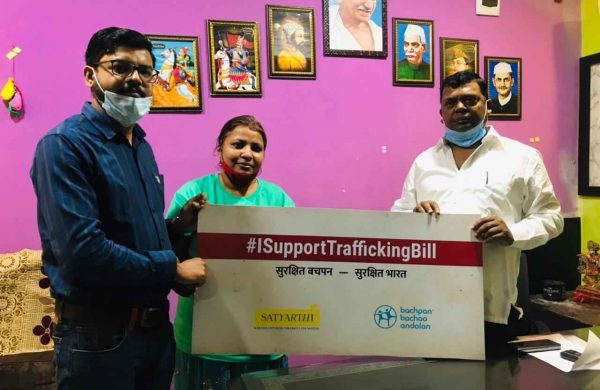

Chandraprakash Choudhary – Giridih, Jharkhand
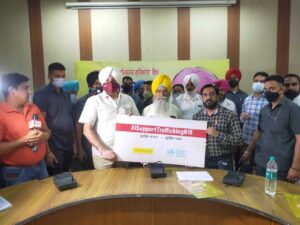

Ravneet Singh Bittu – Ludhiana, Punjab
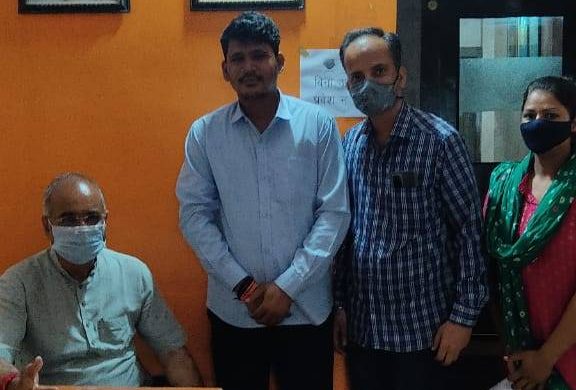

Rodmal Nagar – Rajgarh, Madhya Pradesh
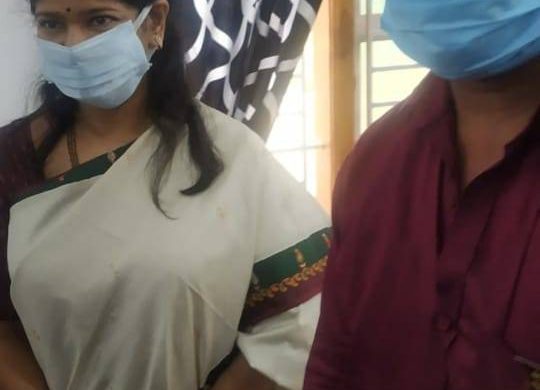

Kanimozi Karunanidhi – Thoothukkudi, Tamil Nadu
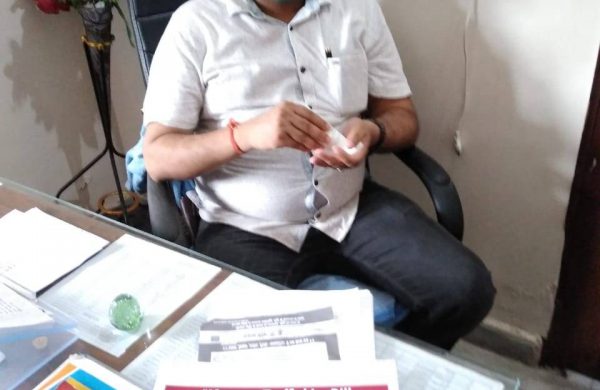

Sunil Kumar – Valmiki Nagar, Bihar
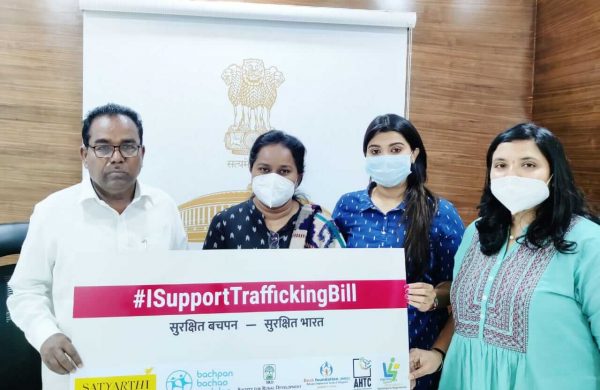

Shri Ramulu – Nagarkunool, Telangana
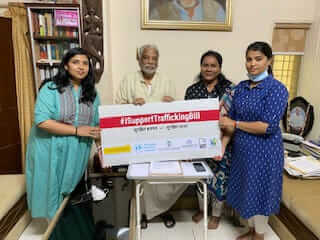

K. Keshava Rao – Telangana
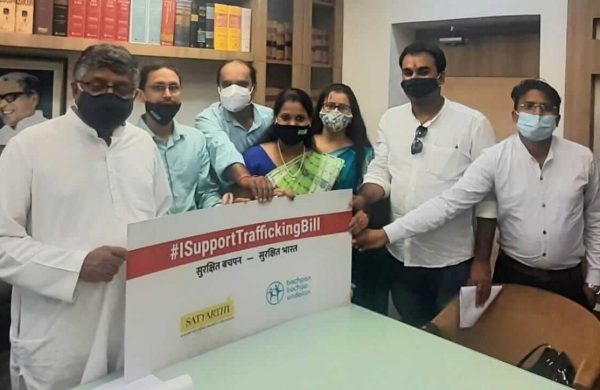

Ravi Shankar Prasad – Patna Sahib, Bihar
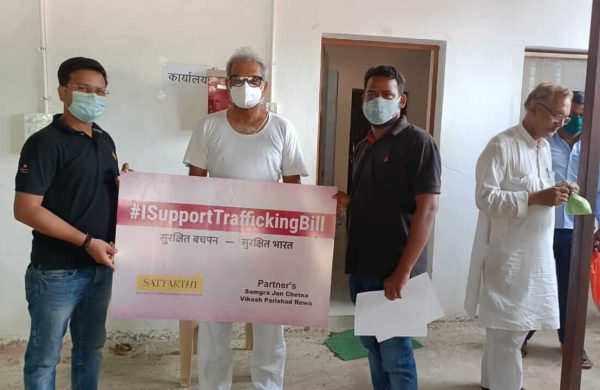

Janardan Mishra – Rewa, Madhya Pradesh
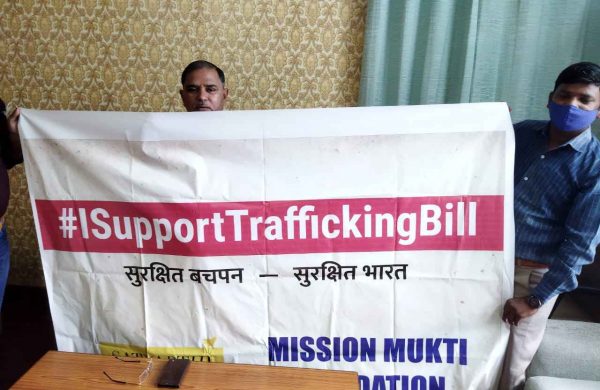

Vijay Kumar Manjhi - Bihar
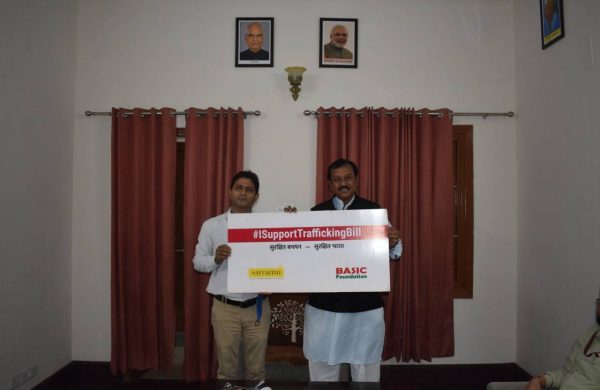

Vijay Baghel - Durg, Chattisgarh
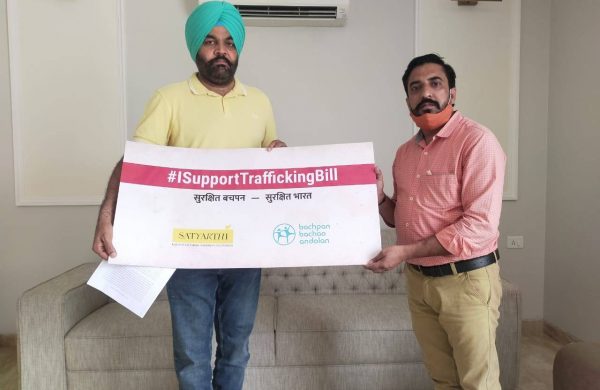

Gurjeet Singh Aujla - Amritsar, Punjab
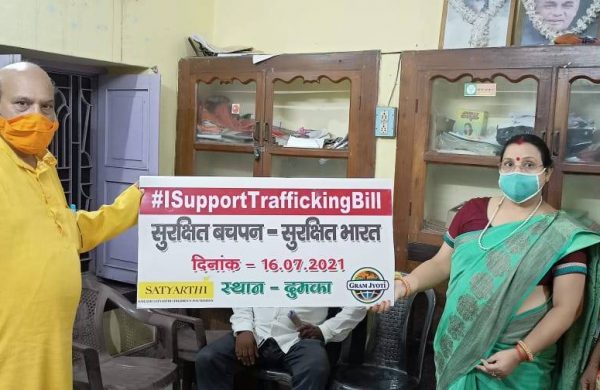

Sunil Soren - Dumka Jharkhand
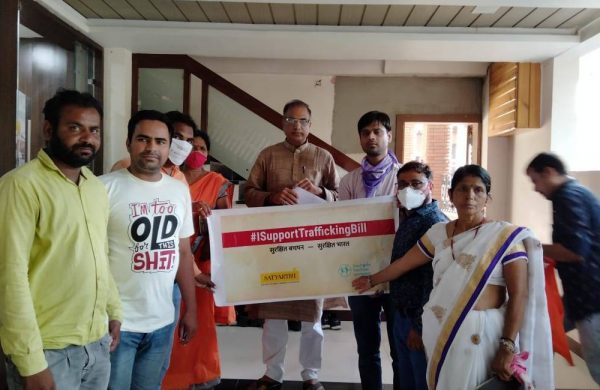

Sudhir Ramchandra Gupta - Mandsaur, Madhya Pradesh
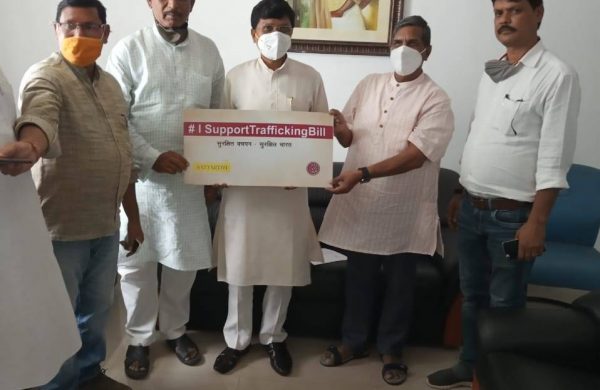

Sudarshan Bhagat - Lohardaga, Jharkhand
| S.No. | List of MP’s supporting trafficking bill |
| 1 | Agrawal, Shri Rajendra Bharatiya Janata Party, Meerut (Uttar Pradesh ) |
| 2 | Khuba,Shri Bhagwanth Bharatiya Janata Party Bidar (Karnataka ) |
| 3 | Annpurna Devi, Smt. Bharatiya Janata Party, Kodarma (Jharkhand ) |
| 4 | Baghel,Prof. S.P. Singh, Bharatiya Janata Party, Agra(SC) (Uttar Pradesh ) |
| 5 | Baghel,Shri Vijay, Bharatiya Janata Party, Durg (Chhattisgarh ) |
| 6 | Bhagat,Shri Sudarshan, Bharatiya Janata Party, Lohardaga(ST) (Jharkhand ) |
| 7 | Joshi, Prof. Rita Bahuguna Bharatiya Janata Party, Allahabad (Uttar Pradesh ) |
| 8 | Kumar,Shri Santosh, Janata Dal (United), Purnia (Bihar ) |
| 9 | Lavu,Shri Sri Krishna Devarayalu YSRCP, Narasaraopet (Andhra Pradesh ) |
| 10 | Prasad,Shri Chandeshwar, Janata Dal (United), Jahanabad (Bihar ) |
| 11 | Prasad,Shri Ravi Shankar, Bharatiya Janata Party, Patna Sahib (Bihar ) |
| 12 | Singh,Shri Lallu, Bharatiya Janata Party, Faizabad (Uttar Pradesh ) |
| 13 | Singh,Shri Ravneet Indian National Congress Ludhiana (Punjab ) |
| 14 | Singh,Shri Sunil Kumar Bharatiya Janata Party Chatra (Jharkhand ) |
| 15 | Seth,Shri Sanjay Bharatiya Janata Party Ranchi (Jharkhand ) |
| 16 | Sawant,Shri Arvind Ganpat Shiv Sena Mumbai-South (Maharashtra ) |
| 17 | Pothuganti,Shri Ramulu Telangana Rashtra Samithi Nagarkurnool(SC) (Telangana ) |
| 18 | Yadav,Shri Dinesh Chandra Janata Dal (United) Madhepura (Bihar ) |
| 19 | Kumar,Shri Sunil Janata Dal (United) Valmiki Nagar (Bihar ) |
| 20 | Choudhary,Shri Chandra Prakash AJSU Party Giridih (Jharkhand ) |
| 21 | Goswami,Shri Dulal Chandra Janata Dal (United) Katihar (Bihar ) |
| 22 | Majumdar,Dr. Sukanta Bharatiya Janata Party Balurghat (West Bengal ) |
| 23 | Karunanidhi,Smt. Kanimozhi Dravida Munnetra Kazhagam Thoothukkudi (Tamil Nadu ) |
| 24 | Dubey,Dr. Nishikant Bharatiya Janata Party Godda (Jharkhand ) |
| 25 | Yadav,Shri Giridhari Janata Dal (United) Banka (Bihar ) |
| 26 | Shejwalkar,Shri Vivek Narayan Bharatiya Janata Party Gwalior (Madhya Pradesh ) |
| 27 | Nagar,Shri Rodmal Bharatiya Janata Party Rajgarh (Madhya Pradesh ) |
| 28 | Yadav,Shri Ram Kripal Bharatiya Janata Party Pataliputra (Bihar ) |
| 29 | Gupta,Shri Sudheer Bharatiya Janata Party Mandsour (Madhya Pradesh ) |
| 30 | Baghel,Shri Vijay Bharatiya Janata Party Durg (Chhattisgarh ) |
| 31 | Tiwari,Shri Manoj Kumar Bharatiya Janata Party North East Delhi (NCT of Delhi ) |
| 32 | Aujla,Shri Gurjeet Singh Indian National Congress Amritsar (Punjab ) |
| 33 | Soren,Shri Sunil Bharatiya Janata Party Dumka(ST) (Jharkhand ) |
| 34 | Saraswati,Shri Sumedhanand Bharatiya Janata Party Sikar (Rajasthan ) |
| 35 | Sangma,Smt. Agatha K. National People’s Party Tura(ST) (Meghalaya ) |
| 36 | Kareem, Shri Elamaram CPI(M) KR |
| 37 | Modi, Shri Sushil Kumar BJP BR |
| 38 | Tamta, Shri Pradeep INC UTK |
| 39 | Yajnik, Dr. Amee INC GJ |
| 40 | Kishore,Shri Kaushal Bharatiya Janata Party Mohanlalganj(SC) (Uttar Pradesh |
| 41 | Saraswati,Shri Sumedhanand Bharatiya Janata Party Sikar (Rajasthan ) |
| 42 | Patel,Smt. Anupriya Apna Dal Mirzapur (Uttar Pradesh ) |
| 43 | Patel,Smt. Keshari Devi Bharatiya Janata Party Phulpur (Uttar Pradesh ) |
| 44 | Thakur, Shri Ram Nath JD(U) BR |
| 45 | Nishad, Shri Vishambhar Prasad SP UP |
| 46 | Shri Ravi Prakash Verma SP |
| 47 | Shri K.C. Tyagi JD(U) |
| 48 | Dr. V. Sivadasan CPI(M) Kerala |
| 49 | Singh, Shri Akhilesh Prasad Congress Bihar |
| 50 | Beesetti ,Dr. Venkata Satyavathi YSRCP Anakapalle (Andhra Pradesh ) |
| 51 | Shri Samir Oraon BJP Jharkhand |
FAQs ON CHILD TRAFFICKING
Globally, one in every three victims of human trafficking detected is a child, but in low income countries, children account for half of the victims detected, most of them trafficked for forced labour. Both girls and boys are vulnerable to being trafficked. However, girls are disproportionally targeted and made to deal with life-long effects of gender inequality and gender-based violence.
In India, disadvantaged communities are most vulnerable to trafficking. Parents of children from these communities are either misled or lured due to their poor socio-economic condition which eventually compel them to ‘send’ or ‘sell’ their children for ‘better livelihood options’. Traffickers promise daily wages to parents and transport them to big cities where they are often treated as commodities.
Children are often trafficked for commercial sexual exploitation or for labour – such as domestic servitude, agricultural work, factory work and mining, or they are forced to fight in conflicts. The most vulnerable children, particularly refugees and migrants, are often preyed upon and their hopes of education, a better job or a better life in a new country are used as baits. Child trafficking also takes form when children are forcefully engaged in begging rackets and other such activities.
Poverty is one of the main causes of child trafficking. Economically disadvantaged families sometimes have no choice but to abandon or ‘sell’ their children, leaving them in the hands of traffickers. Child trafficking is particularly prominent in areas struck by natural disasters. Illiteracy and lack of education make families more vulnerable to traffickers. Some of the most threatened also include children whose births were never registered. Many a times, early marriage of children is also carried out as a camouflage for trafficking.
Trafficked children experience many types of abuse and neglect. Traffickers use physical, sexual and emotional abuse as a form of control. Children and young people are also likely to be physically and emotionally neglected and may be sexually exploited. Children may feel distressed and alienated if they’ve been separated from their families, friends, communities and cultures. They have virtually no access to education or opportunity for social and emotional development.
Thousands of women and children are trafficked every day. Within the overall profile of trafficking in South Asia, India is a country of both transit and destination. There is a considerable degree of internal trafficking as well as some trafficking from India to Gulf States and to South East Asia. Sale of children and their movement across the state borders takes place within the country too.
According to the National Crime Records Bureau (NCRB), there were about 2,200 cases of trafficking in 2019, of which 95 per cent accounted for internal trafficking. As per official figures, 6,616 victims were reported to have been trafficked, including 2,914 children. However, activists say that the actual figure could be much higher as many victims do not register cases with the police, largely because they do not know the law or fear traffickers.
According to a report by the National Human Rights Commission, 40,000 children are abducted each year in India, leaving 11,000 untraced. NGO’s estimate that between 12,000 and 50,000 women and children are trafficked into the country annually from neighbouring nations as a part of a thriving sex trade.
According to the annual National Crime Record Bureau’s (NCRB) ‘Crime in India’ 2019 report, a total of 73,138 children were reported missing. The report also states that the number of missing children increased by 8.9% in 2019. In 2018, the number of missing children was 67,134.
Every eight minutes, a child goes missing in India. Millions of missing children may have been trafficked, who end up in forced labour, slavery and sex work.
The top three states with highest number of human trafficking incidents based on number of cases reported are West Bengal, Rajasthan and Gujarat and the top three states with highest number of human trafficking incidents based on crime rates are West Bengal, Daman and Diu and Goa. States of Maharashtra, Uttar Pradesh, Chhattisgarh, Haryana, Uttarakhand, Mizoram and Nagaland also regularly top child trafficking lists.
Indian laws do not have a legal definition of child trafficking. The Immoral traffic (Prevention) Act deals only with trafficking of minors for prostitution. However, other laws are present which can assist in taking action against child trafficking including the Juvenile Justice Act 2000, Andhra Pradesh Devadasi’s (Prohibition of Dedication) Act, 1988, Bombay Prevention of Begging Act etc.
Stepping up its fight against the scourge of human trafficking, Kailash Satyarthi Children’s Foundation is advocating for the urgent passage of the Trafficking in Persons (Prevention, Care and Rehabilitation) Bill, 2021, which once passed will become the comprehensive law on trafficking in India.
The Immoral Traffic (Prevention) Act, 1956 (ITPA) is the premier legislation for prevention of trafficking for commercial sexual exploitation.
Criminal Law (amendment) Act 2013 has come into force wherein Section 370 of the Indian Penal Code has been substituted with Section 370 and 370A IPC which provides for comprehensive measures to counter the menace of human trafficking including trafficking of children for exploitation in any form including physical exploitation or any form of sexual exploitation, slavery, servitude or forced removal of organs.
Protection of Children from Sexual offences (POCSO) Act, 2012, which has come into effect from November 14, 2012, is a special law to protect children from sexual abuse and exploitation. It provides precise definitions for different forms of sexual abuse, including penetrative and non-penetrative sexual assault, sexual harassment.
There are other specific legislations enacted relating to trafficking in women and children Prohibition of Child Marriage Act, 2006, Bonded Labour System (Abolition) Act, 1976, Child Labour (Prohibition and Regulation) Act, 1986, Transplantation of Human Organs Act, 1994, apart from specific Sections in the IPC, e.g. Sections 372 and 373 dealing with selling and buying of girls for the purpose of prostitution.
State Governments have also enacted specific legislations to deal with the issue. (e.g. The Punjab Prevention of Human Smuggling Act, 2012)
Mukti Caravan or the Campaign on Wheels is the flagship campaign to combat violation of child rights with special focus on child trafficking and child labour by creating awareness among the citizens on these issues.
Led by youth who have been withdrawn from child labour by tireless efforts of Nobel Peace Laureate Kailash Satyarthi, the Mukti Caravan moves across the country, spreading awareness about the organised crime of child trafficking and other forms of exploitation of children through interactions, nukkad nataks or street corner plays, wall writings, pamphlet distribution and screening of audio-visual materials.
KSCF’s Bal Mitra Gram (BMG) is an innovative and transformative grassroots solution to prevent child trafficking and exploitation. It empowers children to take democratic actions to protect their rights and enables parents and other stakeholders to stand up for the rights of children and build a protective community.
KSCF also releases ground based evidences, researches and reports and uses the same for advocacy with the Government and Parliamentarians at national and local level for creation of robust laws and policies on trafficking and ensuring their effective implementation.
- Raise your voice against child trafficking through media, social media, programmes and awareness raising activities
- If you spot children being transported or being employed in a domestic home or factory or a shop, report it at our Complaint Cell – 1800 102 7222 or dial Childline – 1098
- Report child pornography immediately
- Support our work by donating to our campaigns and programmes on child trafficking
- Follow our work on social media
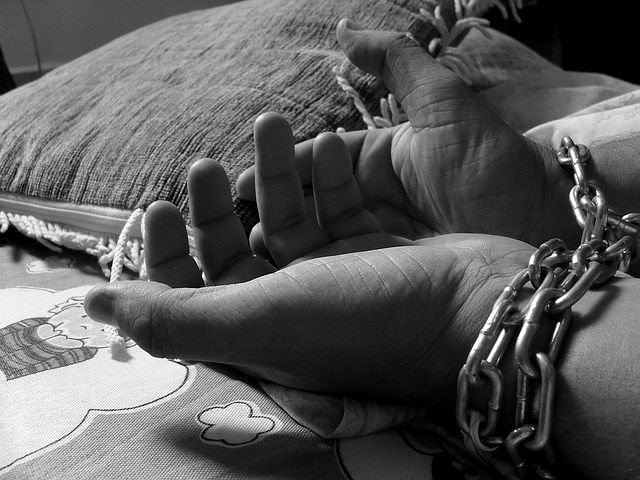

National Consultation
Satyarthi Movement's Fight Against Trafficking
1981
The first-ever rescue of Sabo, a 15- year-old girl who was to be sold into prostitution (along with 34 other bonded labourers working in a brick kiln in Sirhind, Punjab).
1982
The Rescue operations became wide and conducted in 10 states in different sectors of 1. stone quarries | 2. brick kilns | 3. carpet industry | 4. glass and bangles factories
1983
Mr Satyarthi rescued 42 men, women, and children from a brick kiln. Amongst them, Gulabo a 14-year-old died a painful death from deteriorated tuberculosis within days of her rescue. She died in the lap of Mr Kailash Satyarthi. Gulabo’s death intensified Mr Satyarthi’s crusade against child labour and slavery.
Since then; direct action and rescue operations became a strategy for Bachpan Bachao Andolan. The rescue operations were conducted in various parts of the country and various industries like carpet, glass, bangles, stone quarries, brick klin zari, Slate and Pencil etc. These rescue operations uncovered the reality of bonded labour, child labour, trafficking for forced labour in the supply chain.
1984
Carpet industry
Bachpan Bachao Andolan began its fight against child labour in the carpet industry in India whereby public awareness campaigns were started in Mirzapur, Bhadohi, Banaras and Allahabad
1993
Awareness campaigns were launched in Europe and the United States of America against the use of child labour in the carpet industry.
1994
Bachpan Bachao Andolan organized the ‘Bharat Yatra’ - a 5,000 Kms long march against child labour. The march started from Kanyakumari and culminated in Delhi. RUGMARK was launched
1995
“South Asian March against Child Labor and Trafficking” launched from Kolkata to Kathmandu. This was the first march on the issue of cross border trafficking.
1998
80,000 km, 103 countries, and 7.2 million children, women, and men as participants! Yes! This was a year of historic Global March Against Child labor. With the demand to put an international ban on worst forms of child labor, the march began on 17th January 1998 and culminated at ILO office, Geneva on 1st June 1998, thereafter 12th June was declared as “World Day against Child Labor” by ILO.
ILO adopted Convention 182 on worst forms of child labor – a direct impact of the Global March against Child Labor undertaken in 1998
Launch of “Mukti Caravan” at Rajghat, Delhi a mobile grassroots campaign against trafficking to demand an international law against child labour. After launch, the caravan began its journey in the trafficking prone source areas of Bihar. Till today the survivor leasers are working in the source area of trafficking to spread awareness and also collect a database of traffickers. Mukti Caravan has ridden More than 10 lakh kilometres and states covered Bihar, Rajasthan, Jharkhand, Uttar Pradesh, Assam, Madhya Pradesh, Mumbai Nepal.
2002
Campaign to ban child trafficking and employment of child labour in circuses in India.
2003
An MOU was signed between BBA and Indian Circus Industry to stop employment and exploitation of children in the circus.
2004
Mr Kailash Satyarthi with some activists brutally attacked during a raid in karnalgunj Gonda district of Uttar Pradesh while rescuing trafficked Nepalese girls from a circus
2006
Bachpan Bachao Andolan’s sustained campaign and advocacy led to banning of domestic child labor on 10th October 2006 by the Central Government. (Ref- Ins. Sr. 14 & 15 in Part A by Notification No. S.O. 1742 (E) dated 10 October 2006 published in the Gazette of India.)
2007
Launched the second South Asian March from Kolkata Kathmandu-Delhi against child trafficking. The march started on 25 Feb 2007 at Kolkata and culminated on 22 March 2007 in Delhi- a 5000 km long march joined by 1 million people.
Bachpan Bachao Andolan assisted the Government of India in the preparation of the Standard Operating Procedure for Investigation of trafficking for forced labour.
2009
Landmark Judgement by Delhi High Court in ‘Save the Childhood Vs Union of India’ laid down specific roles and responsibilities of Government departments for comprehensive legal action against child labour.
2010
Bachpan Bachao Andolan’s petition, Delhi High Court gave a landmark direction on the trafficking of girls for domestic labour and placement agency.
2011
A landmark, Judgment prohibiting the employment of children in circuses of India was delivered on 18th April 2011 in the writ petition (C) No. 56 of 2006, Bachpan Bachao Andolan Vs Union of India.
Bachpan Bachao Andolan launched first of its kind research report on “Missing Children of India.
2012
Organized a march against child labour and trafficking in the northeast from Guwahati to Dhubri in partnership with NALSA. Hon’ble Chief Justice of India Shri Altamas Kabir flagged off the march on 08th December 2012.
2013
Hon’ble Supreme Court of India gave a landmark judgment on missing children in a PIL filed by Bachpan Bachao Andolan ( WP (C) No 75 of 2012 Bachpan Bachao Andolan Vs. Union of India and Ors). The Court directed that in case of every missing child reported; there will be an initial presumption of either abduction or trafficking, unless, in the investigation, the same is proved otherwise.
Bachpan Bachao Andolan gave suggestions to the Justice Verma Committee on defining human trafficking, which resulted in the inclusion of sections 370 and 370A to address trafficking of persons in the Criminal Law Amendment Act, 2013.
2016
Central Sector Scheme for Rehabilitation of Bonded Labourer revised. The revised Scheme shall be a Central Sector Scheme and shall come into effect from 17th May 2016. For special category beneficiaries such as children including orphans or those rescued from organised and forced begging rings or other forms of forced child labour. and women. the amount of rehabilitation assistance shall be {2 lakhs out of which at least 1,25,000/- shall be deposited in an annuity scheme in the name of each beneficiary and the balance amount shall be transferred to the beneficiary account through ECS.
2017
Bharat Yatra took place in 2017 wherein over 8 lakh people marched 11,000 km across the country for 35 days demanding strict laws against child sexual abuse and trafficking. Bharat Yatra was joined by around 2,50,000 educational Institutions, 500 corporates, 60 faith leaders, 600 government bodies and 500 political leaders. Yatra began on 11 September 2017 from Kanyakumari and culminated on 16 October 2017 at Rashtrapati Bhawan, New Delhi.
Child labour (Prohibition and Regulation) Amendment Act, 2016 rules formulated and notified by the central Government. Bachpan Bachao Andolan assisted the government in drafting the rules
2019
Protection of Children from Sexual Offenses (Amendment) Act, 2019 passed by the Parliament with stringent punishment, the addition of new categories under aggravated offences and inclusion of the definition of child pornography.
Supreme Court takes cognizance of high pendency in POCSO cases and on its direction; Government launched a “Scheme on Fast Track Special Courts for Expeditious Disposal of Cases of Rape and POCSO Act”
2020-21
During the time of pandemic our team was conducting awareness and training on the issue of child labour and trafficking. When the lockdown opened the team with various government agencies rescued more than 11,000 children from trafficking and forced labour.
2021
Bachpan Bachao Andolan has rescued more than 1 lakh children from trafficking, forced labour and child abuse.
Resources
To download Child Labour Handbook
click here
To download Child Labour Projection Report
click here
To download Extent of Child Labour and Prosecution of cases under clrpa in India click here
